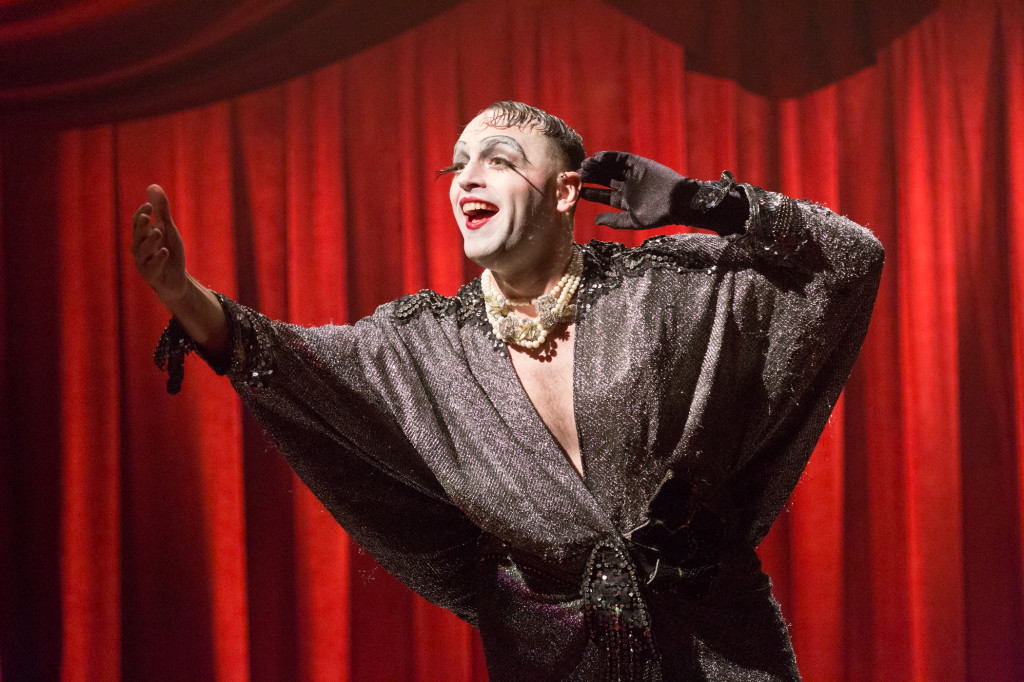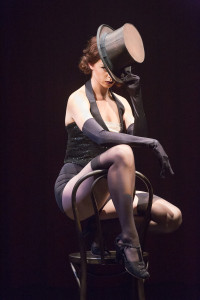
Imagine a burglar who breaks into a house and decides, rather than ransacking the place, to move in and redecorate. That seems to be the artistic impetus behind Matthew Decker’s production of CABARET, which opens the Arden’s thirtieth anniversary season.
Decker borrows liberally from Sam Mendes’s instant-classic revival of John Kander and Fred Ebb’s masterpiece, which has regularly cropped up in London, New York and cities across America for twenty-five years. (A touring version was seen at the Academy of Music earlier this year). Like Mendes, he puts the seedier elements of Weimar Berlin front and center, turning the Kit Kat Club into a cathouse where scantily clad girls — or boys, if that’s your thing — trade sexual favors out in the open. He once again makes the Emcee (John Jarboe) an androgynous and mercurial figure, a lord of misrule in a gaudy triple-strand of pearls.
But Decker occasionally diverts his production from Sam’s script. Mendes worked with a monochromatic color palette, the better to communicate the existential dread of the period. Decker and scenic design David P. Gordon opt for a bit more allure: although rickety wooden chairs are once again used to suggest just about every set piece, the stage is awash in red velvet curtains that look reasonably well maintained. I appreciated the suggestion that while the world outside the Kit Kat Club went to hell, its custodians tried to sustain a modicum of glamour. This willingness to look beyond blacks and grays also allows costume designer Olivera Gajic to craft more eye-catching costumes, several of which look period-specific, and for lighting designer Maria Shaplin to break away from a slavishly noir aesthetic.
Like Mendes though, Decker foregrounds the creeping normalization of Nazism to crushing effect. I’ve always disagreed with this choice. It’s not supported by Joe Masteroff’s libretto, which allows the rising nationalistic tide to subtly swell throughout Act One, building to a terrifying crescendo with the insidious pastiche “Tomorrow Belongs to Me.” If the audience already feels flattened by the inevitable from the opening number onward, where is there to go for the next two-and-a-half hours?

Given the production’s aesthetic, it’s not surprising that the two most fully realized performances come from the actors who play unrepentant Nazis. As Fraulein Kost, Suli Holum fully approximates Weimar style; she sounds like Lotte Lenya and looks like an Otto Dix painting. Casting a slightly older actor in this role makes a lot of psychological sense; an inveterate prostitute with nowhere else to turn, she would be a prime recruit for the Fatherland. Christopher Patrick Mullen’s Ernst Ludwig escapes stock characterization, which makes him all the more chilling. The face of Nazism is a milquetoast, mild-mannered businessman type — ring any bells?
Others fare less well. Jarboe, founder of the gender-bending Bearded Ladies Cabaret, should be perfect casting as the Emcee. But more often than not, he lets his costumes do the work for him. (Some of his frocks look like castoffs from last season’s production of The Legend of Georgia McBride, which Gajic also designed.) Jarboe does less with the text than any Emcee I’ve previously seen; rarely has the shattering final line of “If You Could See Her” — “If you could see her through my eyes, she wouldn’t look Jewish at all” — landed with so little laceration.
Still, he comes across better than Charissa Hogeland, who offers a conservatory-minted take on Sally Bowles: professional, polished and utterly vacant. She doesn’t come close to capturing Sally’s reckless bonhomie. And matters aren’t helped by her veddy upper crust British accent. Sally is a guttersnipe, not a grande dame — a fact made clear by the lyrics to “Perfectly Marvelous” (“She tells me perfectly marvelous tales / of her thrillingly scandalous life”). So why play her like one of Lord Grantham’s daughters?
Poor accent work further hampers the performances of Mary Elizabeth Scallen (Fraulein Schneider) and Kenny Morris (Herr Schultz). The latter just stops trying after a while; the former calls to mind Kate McKinnon’s impersonation of Angela Merkel from Saturday Night Live. Worse, Scallen never communicates Fraulein Schneider’s unflappable sense of self-preservation. “What Would You Do?,” her unnerving ode to ruthless pragmatism, falls flat. The number is also horribly staged: meant as a rebuke to Sally and her idealistic American lover (the bland Daniel Frederick), Scallen delivers it straight to the audience, park-and-bark style.
Given the current political climate and the rise of the so-called “alt-right,” CABARET has taken on a level of relevance perhaps greater than at any other point in its fifty-year history. So it’s such a shame that Decker’s production remains stuck in the past. It’s time to find something new to say with CABARET — there’s certainly plenty to choose from.
[40 N. 2nd Street] September 21-October 22, 2017; ardentheatre.org
